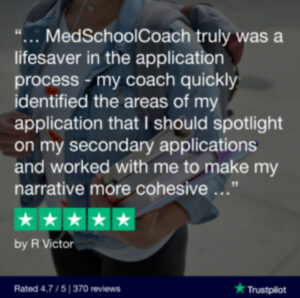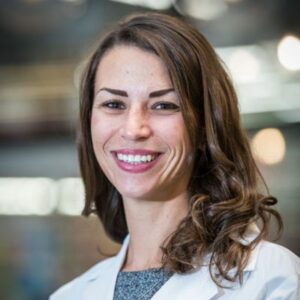
Table of Contents
If you meet a medical program’s basic requirements and their AdComs think you deserve a second look, you’ll be asked to fill out a secondary application. It’s the first exciting step in the process after submitting your primary application that suggests a medical school may be interested in what you can bring to their program.
AdComs use secondary applications to learn more about you and determine which applicants are the best fit for their programs. Secondaries are generally comprised of a series of questions that you’ll answer with short essays.
Want a head start? Check out Prospective Doctor’s database of school-specific prompts for the 2024/25 application cycle.
You should write personalized responses to each program’s secondary essay prompts, but since many of these prompts fit into several basic categories, it’s not quite as daunting a task as writing your personal statement for the primary application. These often fit into broad topics like:
- Diversity
- Why you took a gap year
- Leadership experience
- Types of adversity you have faced
- Why you’re interested in a particular institution
- “Anything else we should know?”
Keep reading for tips on how to write effectively, which essays to prioritize, and how quick your timeline may be. By following these tips, you can effectively showcase your strengths and interests to medical schools and increase your chances of being accepted.
Want expert help to ace your secondaries and med school interviews? Join the 92% of our clients who get into med school.
Secondary Essay Examples for Inspiration
Below, I’ve provided four medical school secondary essay examples. They cover a wide range of subjects and are all real-life examples from our coaching clients, and each student was later accepted by the requesting medical program.
Prompt: Please briefly discuss your research experience. (500 words max)
Essay: Our current study investigates activating transcription factor 3 (ATF3) as a biomarker for spinal cord injury and stroke. We found specific induction of ATF3 in rodent CNS neurons and significant increase in human serum ATF3 within one day of injury or stroke. ATF KO mice also had worsened neurological outcome post-injury, suggesting that ATF3 has some neuroprotective function. As a staff research associate, I use tissue samples to examine the expression of ATF3 on an individual cellular level. To determine correlation between ATF3 levels, AIS score, and AIS improvement of SCI patients, I collect blood samples to quantify biomarker levels. Preliminary data from our ongoing study also demonstrates a positive correlation between serum ATF3 and injury severity in rodents and humans. To design experiments and present my findings, I use analytical skills and practice effective communication.
In undergrad, our lab focused on the nature and function of fear. One challenge in treating PTSD is understanding why some individuals develop disorders while others do not. Using stress-enhanced fear learning procedures, we studied fear-learning as well as voluntary alcohol intake in rodents. The ability to identify potential factors that promote susceptibility will serve as a valuable tool to examine proposed risk factors of PTSD and work toward preventing and reducing the severity of certain mental illnesses. In this role, I strengthened my benchwork, animal handling, and critical thinking skills.
I also worked as a research assistant in a developmental psychology lab at UCLA. Project PEAR investigated executive functioning by assessing how children sustain attention and persist during challenging tasks. I helped run EEG and behavioral sessions, during which I instructed children on tasks while measuring brain activity. The CARE study examined why certain children have more difficulty managing their worries and fears, with the goal of discerning more effective coping mechanisms. I coded audio and video to identify strategies for teachers and parents to use in promoting positive development. Through this experience, I practiced working with children and nurtured my compassion.
Prompt: Describe your identity and how it has impacted the development of your values and attitudes toward individuals different from yourself and how this will impact your interactions with future colleagues and patients. (2500 characters)
Essay: Growing up, I traveled to India during summers to visit my family. Living in India for months at a time allowed me to understand the rich history of my ancestral homeland, Hyderabad. Unlike other parts of India, Hyderabad historically saw collaboration between Hindus and Muslims. They set aside their differences to live peacefully and build long-lasting monuments, such as the Charminar, symbolizing the value of tolerance on which Hyderabad was established. I experienced firsthand how coexistence between Hindus and Muslims persists today, as my family tailor and my apartment watchman have Arabic names and practice Islamic traditions. Recognizing this aspect of my heritage informed my identity as someone who celebrates diversity and understands its importance.
Upon returning to the US, I had a new appreciation for the values of diversity and acceptance, which I now noticed in my hometown as well. Although the people in my community had our differences, we assisted one another during difficult times. Whether it was shoveling driveways during snowstorms or babysitting children of our working neighbors, we could count on the people living around us to understand our needs and support one another. The values I learned from my neighbors continue inspiring me to behave altruistically and help those in need whenever possible.
My experiences reflect the richness of my life as well as the dual nature of my identity. I embody diverse values because I am both an Indian with deep ties to centuries of history and tolerance and an American with compassionate attributes. Throughout my undergraduate years, I delivered meals at food banks, served underprivileged groups and clinics, and treated patients experiencing multiple medical comorbidities as an EMT. By taking these actions, I aim to apply the diverse aspect of my identity in my life and help others overcome the challenges they face.
As a physician, I hope these core values will meaningfully shape my interactions with colleagues and patients. I will work alongside colleagues and staff to collectively improve patient outcomes. With my patients, I will act compassionately and dedicate myself to addressing their needs through high-quality care. Witnessing different parts of the world, learning to appreciate different backgrounds, and selflessly contributing to others’ health will serve me well as I work toward these goals.
Read Next: Writing a Diversity Essay for Medical School (with Examples)
Prompt: Please briefly discuss your research experience. (500 words max)
Essay: Our current study investigates activating transcription factor 3 (ATF3) as a biomarker for spinal cord injury and stroke. We found specific induction of ATF3 in rodent CNS neurons and significant increase in human serum ATF3 within one day of injury or stroke. ATF KO mice also had worsened neurological outcome post-injury, suggesting that ATF3 has some neuroprotective function. As a staff research associate, I use tissue samples to examine the expression of ATF3 on an individual cellular level. To determine correlation between ATF3 levels, AIS score, and AIS improvement of SCI patients, I collect blood samples to quantify biomarker levels. Preliminary data from our ongoing study also demonstrates a positive correlation between serum ATF3 and injury severity in rodents and humans. To design experiments and present my findings, I use analytical skills and practice effective communication.
In undergrad, our lab focused on the nature and function of fear. One challenge in treating PTSD is understanding why some individuals develop disorders while others do not. Using stress-enhanced fear learning procedures, we studied fear-learning as well as voluntary alcohol intake in rodents. The ability to identify potential factors that promote susceptibility will serve as a valuable tool to examine proposed risk factors of PTSD and work toward preventing and reducing the severity of certain mental illnesses. In this role, I strengthened my benchwork, animal handling, and critical thinking skills.
I also worked as a research assistant in a developmental psychology lab at UCLA. Project PEAR investigated executive functioning by assessing how children sustain attention and persist during challenging tasks. I helped run EEG and behavioral sessions, during which I instructed children on tasks while measuring brain activity. The CARE study examined why certain children have more difficulty managing their worries and fears, with the goal of discerning more effective coping mechanisms. I coded audio and video to identify strategies for teachers and parents to use in promoting positive development. Through this experience, I practiced working with children and nurtured my compassion.
Prompt: The Medical College of [LOCATION] is committed to educating health professionals who are dedicated to improving health equity across the diverse populations we serve. Share with us what you have learned or how you have grown through working with or serving people from cultural backgrounds or groups different than your own. How do you believe you can contribute to improving health equity or reducing health disparities as a physician? (2000 characters)
Essay: I can contribute to improving health equity because I have a passion and skillset for caring for persons with disabilities. When I was a freshman, my grandma with Alzheimer’s moved in, and I started to care for her. While caring for her, I learned new communication skills to keep her safe and happy. Initially, it was hard to see her reckon with the side effects of dementia, but I learned to accept her changes by forming new connections and appreciating the person she has become. Caring for my grandmother showed me the positive impact of caring for others, so I applied for a supervisor role in an assisted living facility, where I have helped over 50 residents with varying disabilities. I have worked with nonverbal residents who need assistance in every aspect of life, along with independent residents whom I help with social skills by assisting them in engaging with the community at men’s groups, book clubs, and part-time jobs
Common Questions You May Be Asked
There are specific questions you may be commonly asked in secondary applications. Each medical school has a different process, but there are some patterns.
The number of secondary essay prompts from any given medical school can vary wildly. Some schools may have 1-2 prompts, while others may have a whole slew. Carefully read and follow the prompts provided. Tailor your responses to meet their specific needs and requirements.
The length of your response will also vary. Some prompts allow 300 word limits while others allow up to 500-1000 characters.
Below are some FAQs I see a lot on secondary applications. Knowing what to expect and how to answer them will help the process go faster.
Why do you want to come to [MEDICAL SCHOOL]?
Ah, the dreaded “Why us?” question. Research a school’s website to see what they think they offer, but your response should not directly copy and paste from there.
Instead, use their words as inspiration. Relate back to your experiences and how that fits in with a particular school. Show that you’ve done your research and that you can contribute to this school’s mission statement.
Here are a few tips for approaching the “why this school” question:
- Get specific. Highlight unique programs, opportunities, or faculty at this school that appeal to you. This could be a particular research focus, clinical training opportunities, or student organizations that align with your interests.
- Exhibit your shared values. Explain how the school’s mission and values align with your own. This will show that you have a genuine connection to the school and are a good fit for their community.
- Name drop (sort of). Mention any connections you have to the school, but be modest. This could be a personal connection, such as loved ones who graduated from the school, or a professional connection, such as having a physician affiliated with the school as a mentor. Make sure it’s authentic, as the person you mention will likely be asked to confirm the relationship.
This is also great research to do prior to an interview, as it will likely come up during that process as well.
What is your most important relationship? Who is the most influential person in your life?
This sort of question should be easy to answer. Of course, you can choose a parent or relative, but you can also think outside the box and choose a teacher or a professor.
It’s not the particular person you choose that’s important; it’s how they inspired you to be the person you are, especially if they helped you want to be a physician.
- If you write, “My dad is important to me because he was a doctor and he showed me how to take care of patients,” it will not get you anywhere.
- Instead, you could write, “My dad showed me from an early age what it means to take care of people.” [This makes the reader think, “How did he show you?”] “Not only is he a well-respected doctor in the community,” [Reader: “So this applicant has healthcare in his blood.”] “…but he also shows his care for others through volunteer work.” [Reader: “Oh, he and his family do non-profit work.”] “He often brought me along to volunteer with him at a pop-up clinic, where I saw the dignity he conferred to others…” [Reader: “Giving underserved people dignity is important and natural to him.”] And so on…
What is your most important extracurricular?
Don’t be annoyed by these questions, even though it may feel like you already answered them on the AMCAS.
There are a few approaches to answering this question. If a single activity really is most important, and you already wrote about it as one of your three most meaningful experiences on your AMCAS, you can write about it again in more detail.
If there is something dominant in your life, write about that. For example, if you are a classical musician on the side, a prolific actor in the community, or the area’s top chess player, discuss it!
I would avoid discussing shadowing experiences. Did following around a doctor really change your life? If it really did, talk about it honestly. But don’t force it.
Tell us more about the research you conducted.
This is a straightforward question in which you can discuss your most significant research activities. Make sure to give the reader a framework in the first few sentences. Show them the big picture of your project or lab without bogging the paragraph down with nitty-gritty details.
- Do not start a paragraph with context-less jargon, such as this: “I studied receptor RLAJKNCH – r897 which showed that there was no uptake in expression when compared to JLKASN – 8343 when exposed to methyl-alpha-dioxide.”
- Do write in this style: “The purpose of our research was to understand how toxins affect cells, which in turn could be used to eventually try to come up with novel drugs. In particular, I studied…”
What are your long-term goals?
You don’t need a chosen specialty or fellowship to write about it here — AdComs expect these choices to grow and morph as you actually attend med school. Instead, you can say you are leaning towards X and Y because you have been exposed to them in the past. Or you know you love working with children, and so you’d love to do pediatrics.
Think about how your past experiences fit into your future goals. If you have participated in global health trips, perhaps you want to mention that and say you eventually would love to do international healthcare work.
As always, research each specific school so you can ensure your long-term goals align with their mission.

What do you add to the class? (Diversity)
Diversity is strength — in all its forms. Remember, diversity and inequities come in many packages. Skin color is certainly one of them, but there is so much more. If you are Asian, you may not be considered as diverse when it comes to applying to medical school. Same thing if you are Caucasian.
But what about diversity in your field of study in college? In your interests? In your musical talents? Or in your computer programming skills? Do you come from a unique background in any way?
Read Next: How to Write the Diversity Secondary Essay for Medical School
If you really cannot think of a single thing that distinguishes you, you may be in the wrong field. There is something interesting about you. Find it, and write about it here.
Can you describe a challenge you have overcome?
Lots of medical students say, “I’ve never had a challenge.” While it may be true you didn’t grow up unhoused, surely your life hasn’t been free of hiccups. That said, you should not overplay the time you broke your little toe and couldn’t get to class on time. Steer clear of unethical or insensitive examples.
Examples may include a death in the family, a time when you had to adjust to a new life outside of the home, a time when your sibling was going through depression and you had to help him, etc.
Here are my recommendations for this question:
- Keep it interesting. Boring writing gets looked over, and you want to stand out.
- Connect it back. Relate what you’re saying to things you’ve already done or genuinely want to do.
- Follow instructions. I’ll say it again — give the school what it’s looking for, not tangents and non-sequiturs.
Anything else you’d like us to know?
This question is challenging, but think about your best qualities — your most unique qualities. Have you been able to talk about those traits? If not, here’s your opportunity.
Don’t bore the admissions board with high school stories or irrelevant anecdotes. Instead, exhibit your strength as a prospective med student, your cultural competency, gap year activities if applicable, and your value to the school and to the medical field. Most of these prompts say it outright but don’t reuse your AMCAS personal statement.
Read Next: Applying to Med School as a Non-Traditional Applicant
My Tips for Secondary Essays
I’ve written secondaries — I get it. Although some of this long process may frustrate you, I recommend you take a deep breath and do your best work in a timely manner. There’s a good reason for secondaries, and there are ways to increase your chances.
Here are my top tips for secondary application essay writing:
- Pre-write common responses. Before you receive secondaries, draft up some compelling answers to common secondary questions. Don’t submit these pre-writes word for word, but you can still save time by having something to edit instead of writing a response from scratch.
- Read the instructions carefully. Pay attention to the specific requirements for each secondary application. Some schools may have specific essay prompts, while others may ask for additional information about your experiences or goals that you already discussed on your AMCAS. Know what is expected of you before you begin.
- Prioritize for the best results. First, I would tackle those that you think are short and easy (i.e. no essays or maybe one very short essay). Then move on to your top choice schools. If there is a secondary that has a really tough question, come back to it with a fresh mind at a later time.
- Start early. Secondary applications can take a significant amount of time to complete, so it is crucial to start working on them as soon as possible. You need enough time to thoughtfully complete each application and avoid feeling rushed or stressed.
- Tailor your responses. You may be tempted to copy and paste your responses from one application to the next, but you must tailor your responses to each school. Show that you did your research and are genuinely interested in attending that particular program.
- Proofread. As with any written communication, you must proofread your secondary application for spelling, grammatical, and formatting errors. A well-written application can make a strong impression, while a poorly written one will kill your chances.
- Avoid feeling overwhelmed. You may feel like a bunch of medical schools suddenly inundate you with applications all at one time. You are now looking at a stack of 20 applications, each with 1-6 essays on them. But if you plan ahead and pre-write your essays, you can avoid a lot of that overwhelm. Get a jump start on your secondaries to avoid most of the stress.
- Avoid answering generic questions generically. If you get generic questions like, “Why do you want to come here?” You will feel like saying, “Because it’s a medical school! Why else?!” Instead, tailor your responses, do your research, and add a personal flair that helps your secondary stand out. (This is one reason you should avoid asking ChatGPT to write your answer, although chatbots like it can help in the editing process.)
- Avoid getting frustrated if you already answered a question. Some secondaries ask you to elaborate on experiences you listed on your AMCAS application cycle, or some may repeat a question without acknowledging you ever answered it at all. You can only answer, “Tell us about your most important activities,” in so many ways. Instead of getting frustrated, consider how lucky you are to have gotten a secondary where they want to hear more from you. That’s a good sign you’re being strongly considered for admission!
How Quickly Do I Need to Send In My Secondaries?
I recommend that you complete and submit your medical school secondary applications as soon as possible, as most schools make admissions decisions on a rolling basis. However, it is also important that you have enough time to carefully complete each secondary application and tailor your responses to each school.
Here’s a good rule of thumb: aim to complete and submit each secondary application within 1-2 weeks of receiving it. This timeframe will allow you to thoroughly review the prompts and requirements, gather any necessary materials, and craft well-written responses.
On the other hand, some schools may have specific deadlines for secondary applications, so check the requirements for each school that sends you secondaries. Submit secondary applications at least 2-3 days before the deadline, if possible. Don’t wait until the last minute.
Prioritizing the completion of your secondary applications, managing your time well, and meeting deadlines will demonstrate your commitment to the medical school admissions process and increase your chances of being accepted.
Can I Reuse Secondary Essays for Multiple Programs?
You should reuse information when writing essays for multiple schools. However, that information should always be tailored to the specific program you’re applying to. Make a judgment call about which wording you can copy and paste and what you should write from scratch.
Remember that each medical school has its own mission, values, programs, and opportunities. Be sure that your essays highlight how you align with and will fit into each school’s specific community.
Can I Reuse Secondaries from Past Application Cycles?
It is not advisable to reuse medical school secondary essays from a previous application. To improve your odds the second time around, you have to show schools that you’ve grown as an applicant. This means incorporating information about any new experiences and qualifications you’ve earned since your previous application attempt.
Think about it — what good is re-submitting an essay that wasn’t successful the first time around? Rewrite it if you want to boost your chances.
Also, remember that the schools you are applying to this time around may have different essay prompts or may be looking for different information in their secondary essays.
Is Getting a Secondary a Sign I’m Likely to Be Accepted?
Getting a secondary is a good sign, but it’s not a sure sign you’ll get accepted. It does indicate you’ve moved past an admissions board’s first round of screening applicants. Generally, if you already chose schools you’re a good fit for based on candidacy strength (test scores, GPA, etc.), you’ll probably get multiple secondaries.
Not all applicants will receive secondary applications. Programs generally have a limited number of spots available and receive a

Renee Marinelli, MD
Dr. Marinelli has practiced family medicine, served on the University of California Admissions Committee, and has helped hundreds of students get into medical school. She spearheads a team of physician advisors who guide MedSchoolCoach students.





